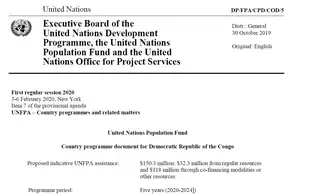The United Nations Population Fund launches a strategical support to the Congolese Ministry of Public Health to reduce the risk of Ebola transmission in reproductive health services and maternity settings. This initiative comes as a response to growing evidence that reproductive health services and maternity wards frequently manipulate several types of biological fluid throughout the chain of reproductive and maternal health care; ranging from gynecological consultations to the management of wastes after child birth. Within the framework of delivering her reproductive health advocacy mandate, UNFPA in DRC aims to reduce the heavy toll that health care workers have already paid since the outbreak of the disease. In fact, more than 5% of those who died of Ebola Virus Disease (EVD) were health workers who became infected while administering care to their patients. In addition, it has been clearly demonstrated that they developed the disease after having contact with a patient’s body fluid. To break this chain of transmission, UNFPA in partnership with WHO and the DRC Government commits to strengthening the infection prevention and control(IPC) in health facilities in the Ebola affected areas.
Never lose fife while helping to give life
Specific training modules have been developed and are mainly available for midwives and skilled birth attendants operating in areas of risks. Detailed analysis reveal that particular needs of women and children were not sufficiently addressed in the first three strategic response plans to the disease. Hence, implementing this fourth strategy, the focus on infection prevention and control in reproductive health services and maternities is an innovative approach. The partnership between UNFPA and the ministry targets some 400 midwives in more than 300 health facilities in high-risk areas. Midwifery supervisors have been identified, trained and deployed reinforce infection prevention and control measures within maternity wards of the two provinces of North Kivu and Ituri. Dr. Monique KAPAMBA, a National Reproductive Health Program Manager leads the teams of trainers hired by UNFPA to build capacity of medical personnel in Ebola affected areas. She confesses that reproductive health services and maternities constitute high-risk environments for the transmission of EVD. She states that: "Obstetric care and more specifically child birth, an act of giving new life, carry a very high risk of contamination with the virus through biological fluids. Moreover, in maternity wards, pregnant women and newborns are potential vectors of EVD due to their compromised immune system. Therefore, it is urgent and important to strengthen preventive measures in maternity hospitals located in risk areas.
"Moreover, activities of infection prevention and control in gynecological and obstetric environments such as the installation of isolation spaces, compliance with standard IPC measures, compliance with IPC standards during child birth etc., are essential measures to break the disease’s chain of transmission. She concludes that "the supervision of IPC activities in maternity wards is crucial for the implementation of the IPC complete minimum package while also maintaining the IPC performance within gynecological-obstetric environment».
delivering an infection prevention and control(IPC) to medical doctors,
gynecologists, midwives and birth attendants in Butembo
UNFPA focuses on maternal health
To meet its objective of eliminating preventable maternal deaths and target zero Ebola transmission in reproductive health services and maternities, UNFPA alongside with the Ministry of Health and the Ebola response coordination team ensured that every health care provider is able to apply all standard preventive measures against any form of Ebola contamination during prenatal consultations, labor surveillance, childbirth, post-natal care and waste management in maternity wards. Therefore, it is a critical and lifesaving intervention to train health personnel on stringent Ebola preventive measures while assisting pregnant women and when conducting deliveries, including obstetric complications, and family planning services. Thus, the UNFPA builds capacity of midwives and skilled birth attendants and deploys IPC focal points and supervisors in the health zones.
According to the UNFPA-DRC Humanitarian Coordinator who doubles for UNFPA response coordinator for the EVD response, Dr Polycarpe Takou, "These trainings of medical doctors, gynecologists, midwives and birth attendants are the materialization of UNFPA's commitment to support the implementation of the current national strategic response plan against EVD. This initiative aims to ensure that application of preventive measures becomes a reflex and routine attitude developed by health personnel. That is why UNFPA puts in place a system of regular supervision of these trained personnel to monitor the change of attitude. In addition to the trainings and related supervisions, UNFPA provides maternities with essential equipment to ensure full implementation of IPC measures and render them Ebola free places. 'These initiatives are complementary to the rehabilitation and equipment of several maternities in the EVD hot spots of Mangina, Beni, and Katwa.”
Incentives for the UNFPA initiative: The General Coordinator of Ebola response, Professor Steve Ahuka congratulates the UNFPA initiative for anticipating preventive and infection control measures in maternities. He notes that "The Ebola Virus Epidemic (EVD) is not sparing anyone. Pregnant and breastfeeding women as well as health personnel operating in maternity wards need protection and UNFPA’s activities are helping to achieve this. Ensuring compliance with infection prevention and control measures in maternity hospitals is an effective strategy which contributes to the efforts of the national coordination team to break the chain of transmission of this terrible disease”
Supervision by peers: an approach for change in maternities
Since the beginning of October, teams of midwifery supervisors are touring Health zones of Ituri and North Kivu to ensure that their colleagues conduct deliveries with no risk of infection by the Ebola Virus Disease (EVD). Recruited by UNFPA, they are mandated by the Ministry of Health to supervise deliveries in maternity hospitals and other health centres to ensure that their peers are not at risk of Ebola infection during deliveries as well as others obstetric services. UNFPA’s aim in deploying peer supervisors is to ensure IPC standard measures are ensured in some 300 health facilities identified to be at risk in the two provinces of Democratic Republic of Congo. This approach will contribute to stopping the rapid spatial progression of the disease and block the chain of transmission at the level of every gynecological and obstetrical services and to ensure that every provider is able to apply norms and preventive measures against all forms of Ebola contamination during prenatal consultations, labor surveillance, child birth, post-natal care and waste management in maternity wards.
by the two supervisory midwives Zawadi and Dayene
of Ebola virus disease by the supervising midwives
« Our peers value our work and commend UNFPA’s livesaving initiative » said Dayene and Zawadi, the duo of maternity supervisors deployed in Goma and neighborhood by the UN agency since the 30th June, 2019. They go round in health facilities to supervise their peer midwives in an attempt to preventing transmission of Ebola virus in maternities. UNFPA DRC created this particular position of midwifery supervisor as it appears obvious that the obstetric environment has been forgotten in the implementation of Ebola standard and additional precautions of infection prevention and control(IPC) in spite of the evidence this medical sector where body fluids are handled at all times including amniotic liquid, blood, urine, vomitus etc. Moreover, it is obvious that pregnant women and newborns are at Ebola high-risk as their immune system is very weak. Thanks to the new job, the two are busy to make inventory of IPC in high risk maternity wards. They mentor their peer midwives, birth attendants and maternity ward aids for the implementation of standard and additional IPC precautions in obstetrical settings and develop with them plans to improve IPC in each maternity. Prior to the UNFPA offer, Zawadi was midwife with the Heal Africa Maternity while Dayenne was part-time service provider for the local catholic church’s hospital. They are both 35 years old and have developed good professional skills and flexible approach toward their peers on the field. In return, most of midwives take ownership of new capacities and value their supervision because they see it very useful in terms of infection prevention and control, and they are confident and quickly understand the changes and improvements they bring even if they are sometimes challenged by medical doctors who hardly accept to learn from midwives.




